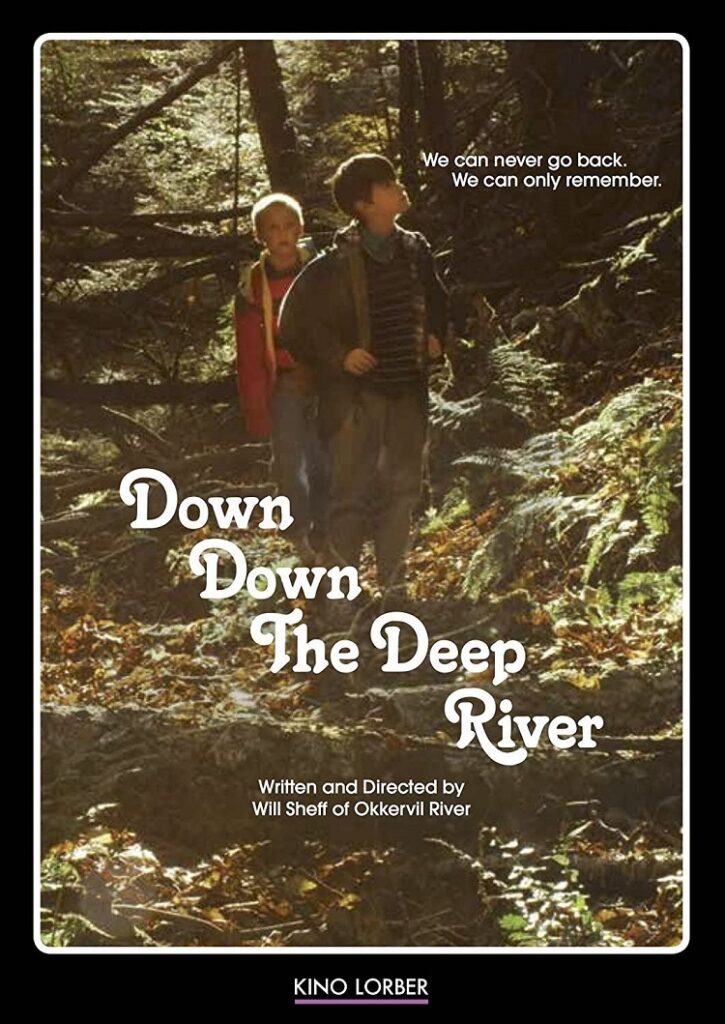
It seems rare in American arts that people are allowed to do more than one thing. It seems almost greedy for someone who is successful in one art form to go and fill up space in another. So Will Sheff, songwriter and apparently only permanent member of Okkervil River, a celebrated indie folk-rock group, has plenty to prove on this venture into filmmaking. An expansion of a song by the same name off their 2013 release The Silver Gymnasium, Down Down the Deep River is a 40-minute short film that turn the song about childhood experience into a narrative about nostalgia.
Almost dialogue-free and with no given character names, Down Down the Deep River is set in 1986, and is about a lonely boy who makes friends with the new kid in school. He and the new kid share secret messages, hide out drawing in the new kid’s house and explore the New Hampshire woods together. They find a creepy old A-frame house splattered with graffiti, and draw their own monster designs on the walls.
Hints of darkness creep in as the story develops. The new kid makes sure that the boy never meets his dad, who sits on the couch with the TV on but staring at nothing. Eventually the story twists into a hybrid of fantasy and realism, when one of the things the kids draw isn’t content to stay on paper, and the relationship between the two friends is tested.
For Will Sheff, the entire process of making the movie was about exorcising his nostalgia. Not only are some aspects of the film autobiographical about growing up in the ’80s, but it is shot largely in the same New Hampshire town where Sheff grew up, and stars almost entirely locals from around the area. Some of the places the characters explore are the same ones that Sheff would go looking for when he was a kid. Whatever additional heft of reality these real places could bring to a film, they could also be a trap – just because the filmmaker feels nostalgia for a certain place does not mean those feelings translate to the audience. The sheer number of period props and movie posters in the kid’s bedrooms can feel like overkill, or winking, rather than period detail.
Down Down the Deep River works, though, largely by keeping its story simple, and pointed. It never veers into the realm of “experimental film” style abstraction. The scenes are grounded and relatively clear, even as the narrative itself starts to venture off into strange places. This sense of story is helped by the film’s very active sound design, including a soundtrack by Sheff with a number of different reworked versions of the title song.
On a technical level Down Down the Deep River, which was partially funded with a Kickstarter in 2013, manages to look like an actual movie. That’s hard to do on an extremely low budget. Even harder is to make a low budget period piece, but Down Down the Deep River looks like it came out of the ’80s. More than the period posters, the clothes, the costumes and the kids look like something I might have seen in a classroom of my own youth. The film takes place over the course of a year, with the changing mood of the story moving along with the changing seasons, from springtime enthusiasm to cold winter sadness.
Whether Down Down the Deep River is of interest to a general audience or just the sort of thing for people who have already bought into Will Sheff’s artistic point of view is hard to gauge. I’m a fan of the band (though I apparently don’t follow them that terribly closely, since I didn’t know this movie existed before a couple months ago) and enjoyed the film, and was touched by its story of youthful excitement and disappointment. With its intentional idiosyncrasies, it probably would have worn out its welcome had it gone on to a full feature length, but as it stands it’s a deft piece of work, as it ultimately becomes more about nostalgia than being itself overly nostalgic.
This DVD release by Kino Lorber contains a number of extras. There’s a commentary track on the film by Will Sheff and his cinematographer, Johnny North, where he goes into detail on the production. A 25-minute making-of documentary covers some of the same ground, but with enough different details to make both worth a look. There’s a few deleted scenes, and most idiosyncratically, a Read-Along adventure book. This booklet retells the story of the movie (and indeed clarifies some points that were still obscure from watching) along with a dramatized recording on the DVD. As a bonus for Okkervil River fans, the disc also includes a collection of 17 Okkervil River music videos, which makes this bonus significantly longer than the film it’s an extra for.